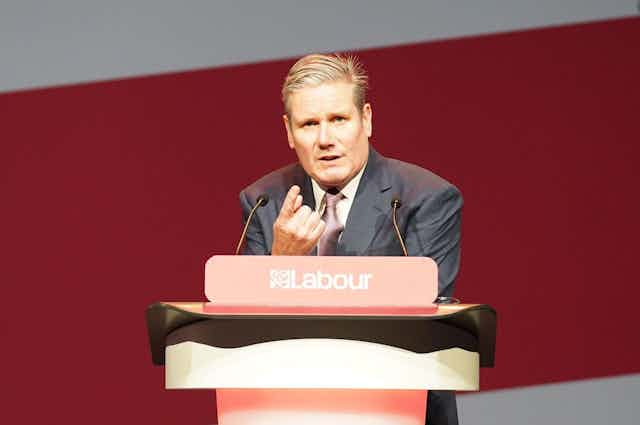Labour leader Keir Starmer has committed to rewriting the UK’s Brexit deal with the European Union when it comes up for review in 2025, if his party is elected to government. He has said he wants a closer trading relationship and better terms than former prime minister Boris Johnson negotiated and has argued this is a necessary step for future national growth.
Labour is certainly not proposing to rejoin the EU, but this nevertheless seems a risky topic for the leader of a party that has so often been on the back foot of Brexit. But is it? Much has changed since the fraught years that followed the 2016 vote to leave the EU – and even since the 2019 election, which was fought and won on a Brexit campaign.
Unlike the years between 2016 and 2019, the Labour leader’s position is now more aligned with that of the public. A majority of people now believe it was wrong to leave the EU, with just a third saying it was the right decision.
Even among those who voted to leave, just over a quarter now think it was the wrong decision or are no longer sure. A combination of new voters entering the electorate since 2016 and some Leave voters changing their mind has meant that the public voice on the issue is markedly different than it was then and in 2019.

However, this is not the only factor Starmer will have to consider as he shapes his position on the UK’s future relationship with the EU. Another development in recent years is that Brexit is no longer seen as an important issue – and it is not even close to being one.
As of October 2, just 16% of people rated leaving the EU as one of the most important issues facing the country. That is far below the economy, crime, immigration, health and the environment.
Belief in its importance is even lower amongst those who voted Leave (9%) – the people most likely to see renegotiating the current terms with Europe as a risk. This has two implications – one good and one bad for Starmer.
The first is that, simply put, people may just not care if he rewrites the Brexit deal. They have more urgent matters on their minds. However, they might equally feel that in reopening the discussions, the Labour leader would be focusing on issues that they have had enough of when the country faces substantial social and economic challenges.
So, there are opportunities and risks for Starmer. Much like when the EU issue became almost synonymous with immigration, how much the Brexit issue cuts through to the public, and the effect it has, may depend on which issues it becomes associated with, if any.
There is a suggestion from Starmer that he is attempting to link the negotiations with the the economy and cost of living generally (by far the most important issues), as well as a vision for a more hopeful future. This may prove successful since a third of the public, and nearly half of Labour voters, already think Brexit has had a role to play in the cost of living crisis.
Minds on other things
Overall, the issue is not likely to be a live one, drowned out by much more urgent problems. Starmer may see this as a positive, meaning he can negotiate outside of the public eye. Or he may attempt to tie the negotiations, even loosely, to a broader programme to heal the country’s economy and society.
Much could also still change. As of June, 44% of people had no idea what Starmer’s position on the EU was, and just 19% think Labour is the best party to handle Brexit (tied with “none”, and below “don’t know” at 25%).
Where there is ambiguity, there is possibility for change. Which direction that is likely depends on which issues the negotiation becomes associated with, and how Labour is perceived on those issues.

